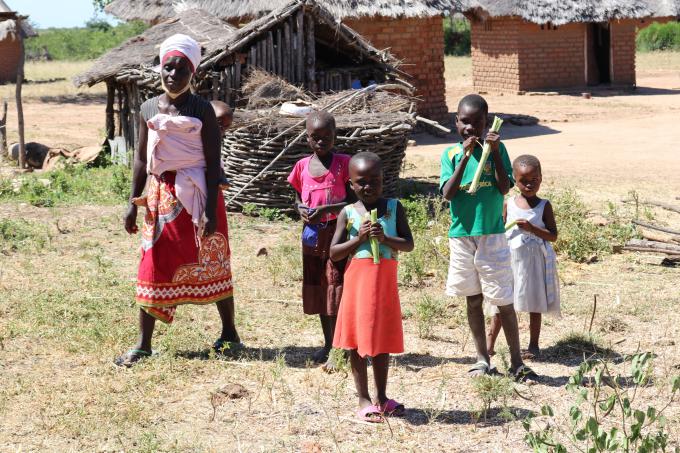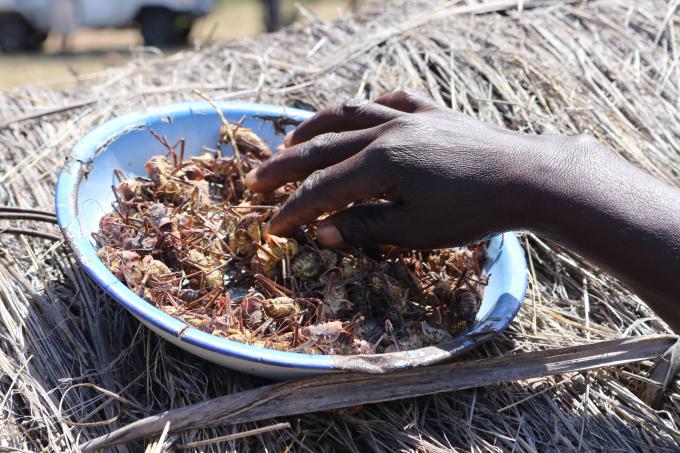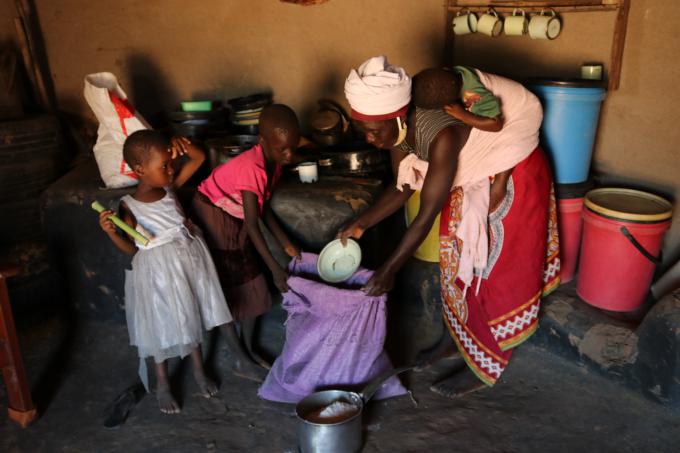Cash Transfers: A Life-line for Food Insecure Families
For Wendy (6) and her family, crickets had become a daily meal, until they started receiving USD65 to buy food every month, under Save the Children’s ECHO funded cash transfer programme.
Wendy, lives in northern Zimbabwe with her grandparents, six siblings, an uncle and her parents. In the past two years, their district received very low rainfall and they failed to harvest enough food to sustain them throughout the year. Food shortages forced her family to take desperate measures to feed themselves including eating insects.
Wendy’s grandmother explains: “There was serious hunger at this homestead, among my neighbours and fellow villagers. We didn’t receive good rains in this area last year, so our crops dried up, and the sorghum wilted before reaching the maturity stage. We only harvested four bags of sorghum last year.”
“We eat sadza (thick maize meal porridge and staple food in Zimbabwe) on a daily basis. Four bags (200kg maize) is too little and could not last us for a year. We are a big family and we consume two bags each month.”
“We have been surviving on crickets. My grandchildren would gather them on their way from school and we cook and eat. These creatures have a poisonous part close to their necks which should be removed prior to cooking them. If you don’t remove it, the poison affects your bladder and you will struggle to urinate for about two days, and you also feel some pain.”
To couple the drought calamity, Wendy’s father, Tinawo, who worked in the city as a street vendor, lost his job during the 2020 COVID-induced lockdown and restrictions on movements. He was unable to pay rentals or raise enough money to send to his elderly parents who were taking care of his seven children in the village. Stranded in the city, with no income, Tinawo and his wife also went back to stay in the village.
Climate change and COVID-19 is directly impacting children’s dietary requirements. Wendy’s grandmother, Mary, recalls the difficulties she faced trying to feed her grandchildren during the peak hunger period in 2019 and 2020. She says there were times her grandchildren had to miss school because of hunger. “Last year I struggled to get mealie-meal for sadza. There are times my husband and I would do casual labour, like constructing a fowl run and get paid a bucket of sorghum.” “There are times we went for two days without eating sadza, because we did not have maize-meal to cook sadza.”
“There were times when my grandchildren had to miss school because of hunger. If you don’t cook sadza, the child won’t go to school and you cannot force them. It really pained me, and I ran out of ideas, as to what to do or offer my grandchildren. The situation here in rural areas is tough.”
A life-line for the Family
Through financial support from European Union Civil Protection Unit (ECHO), Save the Children in partnership with International Rescue Committee is implementing the Safe Multipurpose Assistance to Communities in Crisis (SMACC) project in five districts of Zimbabwe namely, Mbire, Beitbridge, Matobo, Chimanimani and Chipinge.
Wendy’s family is among 23715 vulnerable and food insecure families benefiting from the project. Every month, they receive USD65. The money enables Wendy’s grandmother to buy basic food commodities, that ensures her family continues to eat three meals throughout the peak hunger period.
Mary utters: “This money has helped us a lot. If it wasn’t for the money, we would be having many graves here.” “After receiving the money, we buy buckets of maize, and use the change to buy salt, cooking oil and soap. A bucket of maize costs USD5, and I use $25 to buy 5 buckets, and the remainder would go towards soap and salt.”
Building Resilience
The cash transfer project which started in September 2020 ends in June this year. As part of resilience building, Wendy’s family also received vegetable seedlings from Save the Children, for their use in starting a vegetable garden.
“I also received vegetable seeds from Save the Children. I was given tomato, rape and onion seed packs. They also gave me a pesticide to protect my vegetables. I am about to start my garden and prepare the nursery, because in the past few days it was raining heavily.” said Mary.
Wendy’s grandmother says she is thankful for the assistance her family received: “I am grateful to ECHO for helping us. Without them, we were going to have many deaths due to hunger in this district. I am thankful. I really had a heavy burden and was often stressed. When a child is hungry, they come to the mother and cry. They hardly go to the father.”
 Zimbabwe
Zimbabwe 

